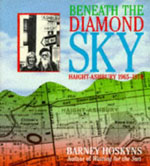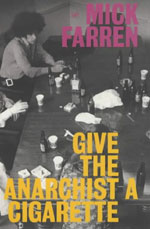Secondhand Nostalgia | |

| Although I can't deny the fact I'm not officially "young" any more, I'm also aware that any nostalgia I have for the hippies and music of the 60s is not genuine. As a lad in shorts at school in West London, I had very little contact with or knowledge of the anglicised version of flower power, let alone with the original West Coast version of Haight Ashbury that Barney Hoskyns brilliantly describes in Beneath the Diamond Sky: Haight-Ashbury 1965-1970. Like Waiting for the Sun, his study of 60s Los Angeles music, Beneath... is a readable, informative, passionate exploration of the music and counter-cultural scene of the Bay Area in California, particularly its two focus points of Haight Ashbury and Berkeley's Telegraph Avenue. Hoskyns starts his story back at the beginning, with early explorations of LSD and improvisatory rock, before moving on to the more familiar acid tests, lightshows and radical politics that spawned the commercial era of the movement. He catalogues not only the expected bands such as Jefferson Airplane and Grateful Dead, but also the forgotten and half-successful music of the city, before, during and after the couple of years when "the Haight" was packed with runaway longhairs looking for some kind of truth or escape they would never find. As you'd imagine the story fizzles out as bands either become mega-success stories or drug-casualties, commercial interests commandeer and taint all that was good, and the whole thing becomes big business and fashion. [No surprise there, then?] Mick Farren never had any rose-tinted specs on as part of the English version of the scene. His was more a dirty-jeans-and-leather-jacket hippydom, spawned from underground rhythm and blues and fuelled by speed and alcohol. In Give the Anarchist a Cigarette he nonchalantly saunters through the London counterculture, remembering long-gone clubs and parties, concerts, magazines and "events". In his time, Farren seems to have been involved with just about everyone and anyone you might associate with the late 60s/early 70s. And if he is to be believed, he took no nonsense from any of them. He may have been knocked down and burnt a few times, but he managed to walk out of it all unscathed and apparently unchanged and unrepentant. By expecting the worst of people you can never be disappointed, and when something wonderful does happens, it's even more wonderful and surprising. |

| Farren is funny, cynical and very readable. He conjures up Notting Hill in its early pre-yuppie days, as well as much of London and New York. He parties and drinks with rock'n'rollers, hippies, punks and - well, anyone who'll let him near the booze really. He re-invents his band The Social Deviants as an important band of the time [they weren't and - be warned - their music is consistently appalling] but you can forgive him this as he swaggers through the last thirty-plus years, stopping only for a funny story or an occasional maudlin glanceback, a cynical aside. This is the best, most realist, book about British music and culture I've read. Farren is brilliant. And if it's brilliant music you want, then for me it has to be at the moment The Velvet Undergound, the bridge between the hippies, pop art and punk. In the recently reissued Up-Tight:The Velvet Underground Story Victor Bockris proves once again that he can't write to save his life, but just about manages to tell his own version of how the band got together and their initial progress in the world. Sure, it has a dreadful section - written years after the book was originally published - about the reformed VU in the 90s, but the early music and line-up continues to intrigue. Here, amongst all the Aquarian-age nonsense and never-ending stoner guitar solos of the time, are a band busy making the loudest noise they can. They sing about junkies and life on the New York streets, they wear black and play in the dark, with only arty-farty film projections and self-mythologising dancers to look at; that is if your eardrums don't burst if you stay in the same room. Later on, of course, there's Warhol and the Factory crowd, there's ice-maiden Nico, and there's internal fighting, exits and entrances, overproduced and underproduced records, bootlegs, live records and dissolution. And a decade or more later, and now 30 years on, we look back at the Velvets as one of the most important, radical and succesful bands ever. And quite right too. Will we ever write about punk and dance music the same way? Will those younger than us invent their own secondhand nostalgia? Probably. In fact I think they already have. Me? For the moment I'm sticking to the Velvets and their trajectory that led to New York no/new wave: Suicide, Television, Patti Smith. And the cynical jaundiced pose that Mr Farren has mastered so well. [Stick those Floyd and Santana LPs in the cupboard will you? Some one might see them. Thanks.] © 2002 Rupert Loydell |